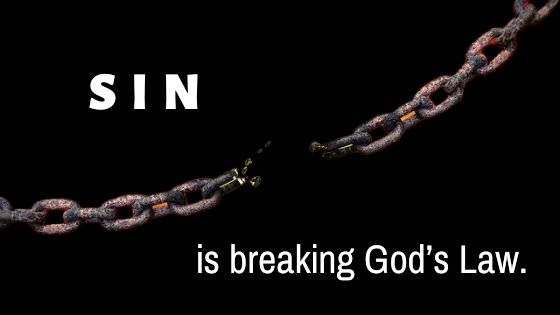In today’s culture where biblical literacy is diminishing, sin has been reduced to some kind of simple misbehavior or minor flaws. Many understand sin to be anything that violates their will and wants. But what is sin according to the Bible? What are the effects of sin and what should be done about it?
What Sin Is
If asked to define sin, people will come up with many different definitions as to what sin is and these are usually the things that the individual does not like. In dealing with sin, it is important to know what sin is.
One of the most common definitions of sin is missing the mark – a failure to live up to an expected standard. The Greek word is hamartia, from the root word hamartanō, an archer’s term meaning to miss the bull’s-eye. The problem with this definition is that it fails to take into account that when the mark is missed, something is hit.

Another definition of sin is found in 1 John 3:4, “sin is lawlessness.” Or as the NLT says, “Everyone who sins is breaking God’s law, for all sin is contrary to the law of God.” Simply put, sin is anything that is contrary to what the Word of God commands or forbids. This definition, however, does not take into account those things about which the Word of God is silent.
The best definition of sin is found in 1 John 5:17, “all unrighteousness is sin.”
The Effects of Sin
Sin, regardless of its degree, always has an effect – death. The entrance of sin into the human race brought with it death (Romans 6:23; James 1:15). That man is a sinner is proven by the fact that he dies, for where there is death, there is sin.
The good news is that sin’s penalty, death, can be remedied by life – union with God. This is achieved by believing in Jesus, who died to pay the penalty of man’s sin (Romans 5:21).
Read here: Death Penalty for Sin, Eternal Life in Christ
The Bible tells us that there are two kinds of death: spiritual and physical. And whether spiritual or physical, death always means separation.
1. Spiritual death
Spiritual death is when a person is alive physically, but dead spiritually. Spiritual death is the state of being alienated from God. Every one of us is born spiritually dead, that is, separated from God, because sin separates one from God. As Isaiah 59:2 says, “But your iniquities (or sins) have separated you from God.”
Spiritual death became a reality for all humanity as a result of the sin of Adam and Eve. Romans 5:12 explains, “Therefore, just as through one man sin entered the world, and death through sin, and thus death spread to all men, because all sinned.”
Adam was told that if he ate of the tree of the knowledge of good and evil that he would die (Genesis 2:17; 3:3). Adam and Eve ate of the tree and immediately died spiritually – their relationship and fellowship with God were broken. And everyone born after them is separated from God.
The good news is, spiritual death need not be a permanent state. God is eager for us to receive the life He is offering. To be rescued from spiritual death, we only need to recognize our sinful state and acknowledge our need of a Savior in the person of Jesus Christ, God’s only Son who gave His life to purchase eternal life for us (John 3:16)
2. Physical death
When Adam deliberately disobeyed God’s command not to eat of the tree of the knowledge of good and evil, he did not only die spiritually, he began to die physically. God’s pronouncement of His judgment of death upon Adam spoke of Adam’s body returning to dust (Genesis 3:19). The body that is made up of dust will return to dust.
Physical death is the separation of the spirit (and soul) from the body. The Scriptures testify to this in Luke 23:46, “And when Jesus had cried out with a loud voice, He said, ‘Father, into Your hands I commit My spirit.’ Having said this, He breathed His last.”
Also, when Jesus raised Jairus’ daughter: “But He put them all outside, took her by the hand and called, saying, ‘Little girl, arise.’ Then her spirit returned, and she arose immediately. And He commanded that she be given something to eat” (Luke 8:54-55).

As far as human knowledge is concerned, death is the place of no return; it is the end of all life and existence for a person (Ecclesiastes 9:5, 10). No matter what your status in life, young or old, rich or poor, sooner or later your body will cease to function. From the moment we are born, we begin to die. That is because the penalty of sin is death.
Again, the good news for the one who believes in Jesus is that the penalty of sin is broken. Yes, he will die physically (unless he is alive when Jesus returns to take all believers to heaven with Himself in an event called the rapture described by Paul in 1 Thessalonians 4:14-18), but physical death for him is only the doorway into the presence of God.
What Should Be Done About Sin
The believer should never condone or attempt to excuse his sin. There are only two things that should be done about sin: confess it and forsake it (Proverbs 28:13).
1. Confess it.
The Old and New Testaments are agreed on this.
Upon realizing his sin of murder and adultery, David confessed his sin and experienced the Lord’s forgiveness (Psalm 32:5). John agrees as he points out: “If we confess our sins, He is faithful and just to forgive us our sins and to cleanse us from all unrighteousness” (1 John 1:9).
To “confess” means to acknowledge or to say the same thing. The believer is instructed that he is to say the same thing as God says about his sin, “It is sin.”
When the believer confesses his sin, he has the assurance that God is “faithful” (He can be counted upon to keep His word) and “just” (He is just in dealing with our sins because He paid the price for them) “to forgive us our sins and cleanse us from all unrighteousness.”
There is no sin too great and no sin too small – God is able to cleanse us completely from anything that is inconsistent with His own moral character.
2. Forsake it.
Sin in the believer’s life is a terrible thing and is not to be tolerated because it mars his fellowship with God. Sin, whether committed against God or a fellow human being, has a detrimental effect on their relationship and fellowship.
That’s why it is important for the believer, after receiving forgiveness and cleansing, to forsake his sin and yield completely to God. In doing this the believer is restored to full fellowship with God.

Closing Thoughts
As God’s children, He expects us to live a life of godly character and to become more like Him (Matthew 5:48; 1 Peter 1:16). We are to build a godly character by remaining faithful to what is right according to God, not what the world thinks is right.
Some say this is quite difficult to do, and I agree. We are all by nature sinful, we are all fallen (Romans 3:23). But because “Jesus Himself bore our sins in His own body on the tree, we have already died to sins so that we might live for His righteousness” (1 Peter 2:24). We are to live by faith that God will give us the strength to resist the urge to sin.
While it is probable that the believer will sin, no one who is in Christ will continue to sin (1 John 3:6) and anyone born of God does not keep on sinning (1 John 5:18 ESV). Is John saying that believers automatically become sinless?
No! He simply means that believers will not continue practicing sin as a way of life. A person who claims to be a Christian but is living contrary to God’s will is showing the world that he or she is not really saved, to begin with. A genuine believer in Jesus will not knowingly, deliberately, and habitually sin.
Do you sometimes feel the urge to commit sin? What are you doing to resist it?


Hello Alice,
Thank you for this great sermon. Sin is like a deadly virus that must be cured. Sin is a pestilence to the soul, creating a gap between you and God. This virus can’t go unchecked unless we turn to God to cure us and cleanse our souls. There is not one human except Jesus who has not been prey to sin. We all sin. The real test is how you respond to that sin.
Next week, my club is starting a theme on sin and repentance. I plan to use this presentation as part of my sermons. Your presentation is very insightful and challenges many believers to dive deep into the Scriptures and examine our lives.
The issue of morality and ethical living is something that Christians should be aware of, as God expects us to submit to His moral standards.
🙂
You’re right, Maia! Sin is like a virus that must be dealt with. It’s just unfortunate that many of the people who are living in sin are not aware of their condition.
Praying for the victory of your upcoming activities ☺.